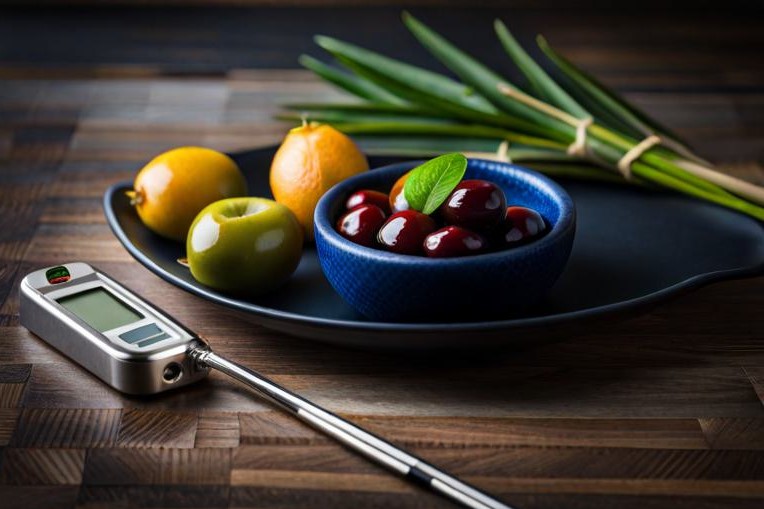If you’re someone who struggles with insulin resistance, you’re not alone. Millions of people around the world suffer from this condition, which occurs when your body becomes resistant to the effects of insulin and has trouble regulating blood sugar levels. This can lead to a host of health issues, including type 2 diabetes, heart disease, and obesity.
But did you know that olives could be a key player in improving your insulin sensitivity? Olives have been used for thousands of years as both a food and medicine, thanks to their many health benefits.

Recent studies have found that there is a surprising connection between olives and insulin resistance. It helps improve insulin sensitivity and regulate blood sugar levels. In fact, some researchers believe that incorporating olives into your diet could be an effective way to manage or even prevent insulin resistance altogether.
So if you’re looking for a natural way to improve your health and reduce your risk of chronic diseases, read on to learn more about the connection between olives and insulin resistance.
Understanding Insulin Resistance
You might be surprised to learn that your body’s ability to use insulin properly can play a major role in your overall health and well-being.

Insulin is a hormone produced by the pancreas that helps regulate blood sugar levels in the body. When cells become resistant to insulin, it becomes difficult for them to take up glucose from the bloodstream, leading to high blood sugar levels. This condition is known as insulin resistance and is often associated with type 2 diabetes.
There are several causes of insulin resistance, including genetics, obesity, sedentary lifestyle, and poor dietary habits. However, there are also ways to prevent or reverse this condition.
Regular exercise and a healthy diet rich in fiber, whole grains, fruits, vegetables, lean proteins, and healthy fats can help improve insulin sensitivity. Additionally, avoiding processed foods high in sugar and unhealthy fats can also help prevent or reverse insulin resistance.
With this understanding of the importance of proper insulin function for overall health and wellness established, let’s delve into the science behind olives.
The Science Behind Olives
So, you’re probably wondering why olives are so great. Well, let me tell you- the science behind these little guys is pretty impressive.
Olives are a staple of the Mediterranean diet, known for its health benefits. Here’s how olives can help prevent insulin resistance and improve your overall well-being:
- Olives contain monounsaturated fats that reduce inflammation in the body, which is a major contributor to insulin resistance.
- Eating foods high in monounsaturated fats can also lower your risk of heart disease and stroke.
- Olives are rich in antioxidants like vitamin E and polyphenols that protect against oxidative stress.
- Oxidative stress can cause damage to cells and contribute to chronic diseases such as diabetes.
Incorporating olives into your diet doesn’t have to be complicated. Try adding them to salads or pasta dishes, or enjoy them as a snack with some cheese or nuts. By making small changes like this, you can reap the health benefits of olives and improve your overall well-being.
Incorporating Olives into Your Diet
If you’re looking to incorporate olives into your diet, there are a few key things to keep in mind.
First, there are many different types of olives available, each with its own unique flavor and texture.
Second, there are countless recipes and ideas for incorporating olives into your meals, from salads and pizzas to pasta dishes and more.
Finally, when it comes to serving suggestions, olives can be enjoyed on their own as a snack or used as a flavorful garnish for many different dishes.

1. Types of Olives
There are several varieties of olives, including Kalamata, Manzanilla, and Nicoise, each with their own unique flavor profile and culinary uses. Here’s what to consider when choosing which type of olive to incorporate into your diet:
- Health benefits: Olives contain healthy fats that promote heart health and help reduce inflammation in the body.
- Cultural significance: Olives have been a staple in Mediterranean cuisine for centuries and can add depth and authenticity to dishes inspired by this region.
- Personal preference: Some people enjoy the briny, salty taste of Kalamata olives, while others prefer the milder flavor of Nicoise.
When selecting olives for your meals or snacks, consider experimenting with different types to find your favorite. From there, you can explore recipes and ideas for incorporating them into your diet without sacrificing taste or nutrition.
2. Recipes and Ideas
Get ready to tantalize your taste buds with these delicious olive recipes and creative ideas for incorporating olives into your diet! Olives aren’t just great for lowering insulin resistance; they’re also packed with nutrients that can benefit your skin and hair.
You can use olives in skincare products or incorporate olive oil into your hair care routine to get a healthy, radiant glow. When it comes to cooking, there are endless ways to use olives. Toss them in salads, add them to pasta dishes, or even mix them into guacamole for a Mediterranean twist.
You can also make a simple tapenade by blending olives with garlic, lemon juice, and olive oil – perfect as a dip or spread on sandwiches. With all the health benefits and delicious flavors of olives, it’s easy to see why they’re such a popular ingredient in many cuisines.
Now let’s move on to serving suggestions that will take your olive game up a notch!
3. Serving Suggestions
Now you can elevate your culinary game with these mouth-watering serving suggestions that will make you fall in love with olives all over again! Olives are a staple of the Mediterranean diet and have a plethora of health benefits, including their ability to improve insulin resistance.
Here are some creative ways to incorporate olives into your meals:
- Add chopped olives to your morning omelette for an extra burst of flavor.
- Use olive oil as a base for homemade salad dressings or as a drizzle over roasted vegetables.
- Create an antipasto platter featuring olives, cured meats, cheeses, and crackers for a delicious snack or appetizer.
- Stuff green olives with goat cheese and serve them as a fancy party snack.
By incorporating more olive oil and olives into your diet, you can reap the benefits of better insulin sensitivity.
But what about other foods? Let’s explore some additional options in our next section.
Other Foods that Improve Insulin Sensitivity
You can improve your body’s ability to regulate blood sugar by incorporating foods like leafy greens, nuts, and berries into your diet. These foods contain fiber, antioxidants, and other nutrients that can help lower inflammation in the body and improve insulin sensitivity. Green tea and cinnamon are also great options to add to your diet as they have been shown to have a positive effect on insulin sensitivity.

To get started on incorporating these foods into your diet, try adding spinach or kale to your morning smoothie or swapping out white rice for quinoa at dinner. Snack on a handful of almonds or walnuts instead of reaching for processed snacks. Berries make a great addition to yogurt or oatmeal for breakfast. And don’t forget about green tea – it can be enjoyed hot or cold and makes for a refreshing drink option throughout the day. By making small changes like these, you can begin improving your insulin sensitivity and overall health.
As you work towards bettering your insulin sensitivity through dietary changes, lifestyle factors also play an important role in regulating blood sugar levels. Regular exercise, stress management techniques such as meditation or deep breathing exercises, and getting enough sleep each night are all crucial components in achieving optimal insulin sensitivity. By combining healthy eating habits with lifestyle changes, you can take control of your health and reduce the risk of developing conditions such as type 2 diabetes.
Lifestyle Changes for Better Insulin Sensitivity
If you want to improve your insulin sensitivity, there are several lifestyle changes that can help.
First and foremost, make sure you’re getting enough exercise and physical activity in your day-to-day life. This doesn’t have to mean hitting the gym every day; even simple things like taking a walk after dinner or stretching during TV commercials can make a difference.
Additionally, managing stress levels and prioritizing quality sleep and rest are also key factors in improving insulin resistance.
1. Exercise and Physical Activity
Get moving! Regular exercise and physical activity can do wonders for your insulin sensitivity. Engaging in physical activities like group exercise or simple stretching routines can help improve your body’s ability to use insulin effectively, leading to better blood sugar control.
Benefits of group exercise include motivation, accountability, and social support which can keep you consistent with your workouts. Additionally, stretching can reduce muscle tension and improve flexibility which helps you perform other exercises more efficiently.
Physical activity also has an impact on stress management as it releases endorphins that help relieve stress and anxiety. Therefore, incorporating daily exercise into your routine is essential for improving insulin resistance, reducing stress levels, and managing blood sugar levels.
However, before starting any new workout routine or engaging in any strenuous activity, make sure to consult with your doctor first to ensure that it’s safe for you to do so.
2. Stress Management
Managing stress is like taking a deep breath of fresh air for your mind and body, allowing you to feel more relaxed and at ease. When it comes to managing insulin resistance, stress management can play a significant role in improving your overall health.
Chronic stress has been shown to increase inflammation in the body, which can lead to insulin resistance and other health problems. To combat stress, it’s important to incorporate relaxation techniques such as meditation, yoga, or deep breathing exercises into your routine.
These mindfulness exercises can help you stay present in the moment and reduce feelings of anxiety or depression. By incorporating these techniques into your daily routine, you’ll be better equipped to manage stress levels and improve your overall health.
As we transition into the subsequent section about ‘sleep and rest,’ it’s important to note that getting enough restful sleep is also crucial for managing insulin resistance.
3. Sleep and Rest
You need to prioritize getting enough restful sleep if you want to improve your overall health and manage insulin resistance effectively. Lack of sleep can cause havoc on your body, leading to an increase in stress hormones that can cause insulin resistance and weight gain.
When you don’t get enough sleep, your body releases more cortisol, which increases blood sugar levels and makes it harder for insulin to do its job.
Getting enough rest is essential for good health because it allows the body to repair itself at a cellular level. Sleep also helps regulate hormones that control appetite and metabolism, making it easier to maintain a healthy weight.
To ensure you’re getting enough restful sleep each night, try incorporating relaxation techniques into your bedtime routine, like meditation or deep breathing exercises. These practices help calm the mind and reduce stress levels, allowing you to drift off into a peaceful slumber effortlessly.
Remember that prioritizing rest is key when it comes to managing insulin resistance effectively.
Conclusion
You now have a better understanding of how olives can help improve insulin sensitivity and combat insulin resistance. Incorporating this small but powerful fruit into your diet can lead to significant health benefits, such as improved glucose control and reduced risk for type 2 diabetes.
But don’t stop at just adding olives to your meals – there are many other foods that can also improve insulin sensitivity, such as leafy greens, nuts, and whole grains. And don’t forget the importance of lifestyle changes like regular exercise and stress management in maintaining healthy insulin levels.
By making these simple but impactful changes to your diet and lifestyle, you can take control of your health and prevent the negative effects of insulin resistance.